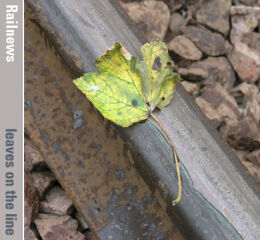Posted 24th September 2025
Dry ice is latest weapon against leaves on the line

Northern is using a new weapon to keep autumn leaves at bay, as the leaf fall season arrives. Leaves are falling earlier this year, following the very warm summer.
The problem of leaves on railways is well known, because they are compressed into a slippery film by train wheels which then has the same effect as black ice on roads. The result can be lower train speeds, because braking is affected, and motors can also be damaged by wheel slips.
Now new technology which blasts dry ice on to the rails to clear away fallen leaves is be tried on the Bishop Auckland branch.
A retired Class 142 Pacer fitted with cryogenic cleaning equipment, known as Cryogrip, will run between Bishop Auckland and North Road, using spare paths so that regular trains are not interrupted..
The equipment has been developed by engineers from the train’s owner, the University of Sheffield, and it works by firing dry ice pellets at the railhead in a stream of air at supersonic speed.
Any leaves are frozen and then blasted away, while the frozen carbon dioxide pellets thaw and become CO2 gas.
The technology has already been tested on the heritage Wensleydale Railway in Yorkshire, but this is the first time it will be tested on a National Rail route.
The Pacer will run out of public service, but if the trial is successful, Cryogrip may be used on trains carrying passengers in the future.
Northern’s seasonal performance improvement manager Rob Cummings said: ‘Some people like to make jokes about wet leaves on the line. But when you have steel wheels running on a steel rail, any slippery substance that affects the grip is a big problem.
’There is a comprehensive plan to help our train crews deal with this, which includes forecasting, extensive mapping, railhead treatment trains and sanders.
‘We are also keen to find out whether the cryogenic cleaning equipment is another effective tool which can be used on other parts of our network.’
Roger Lewis, who is professor of mechanical engineering at the University of Sheffield, added: ‘Our track cleaning system could revolutionise how we clean railways, cut delays for passengers and save the industry some of the millions it loses to leaves on the line every year.
‘The testing with Northern is a vital step towards the system being used more widely on lines across the country.’
What do you think? Click here to let us know.
